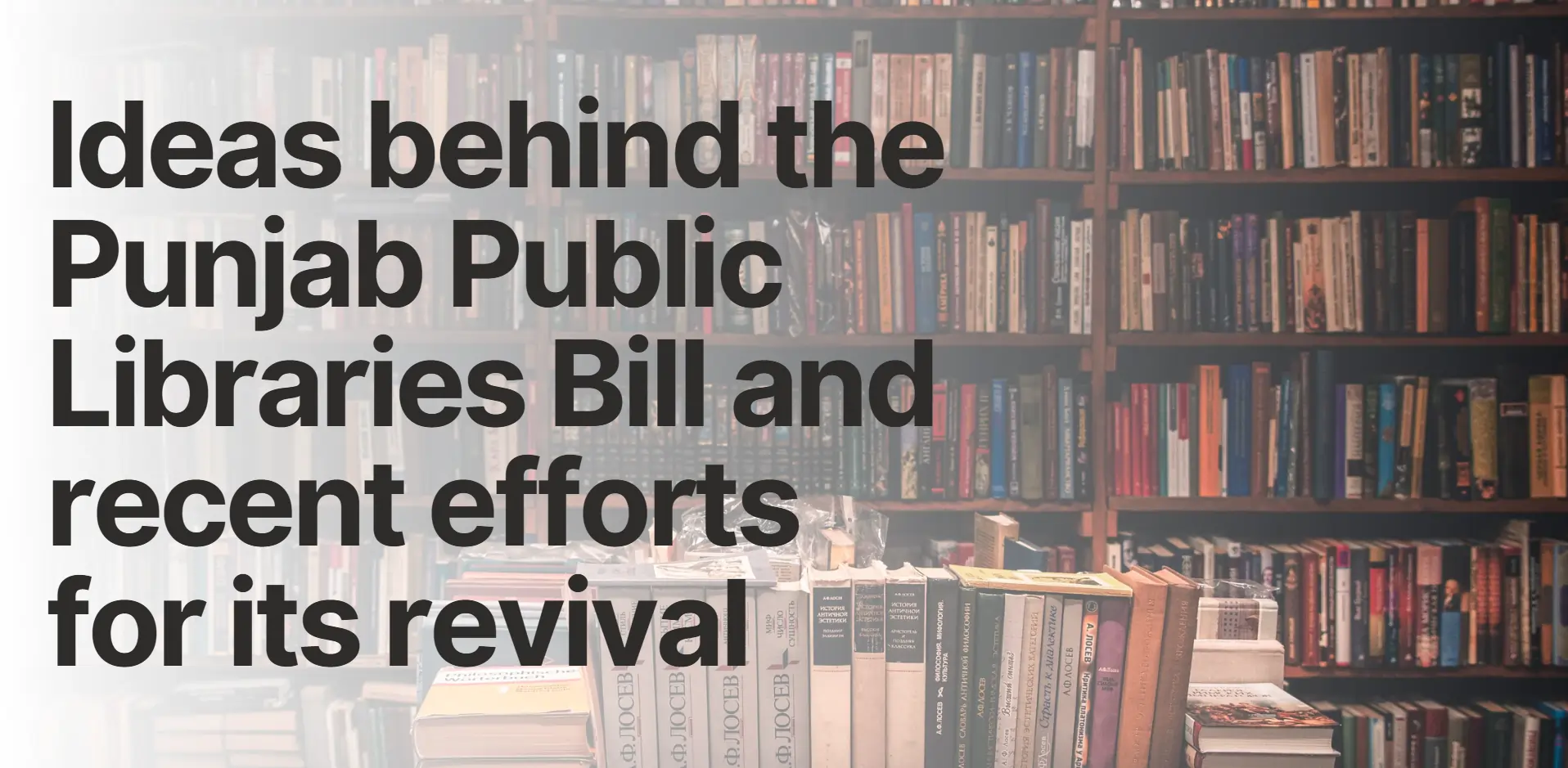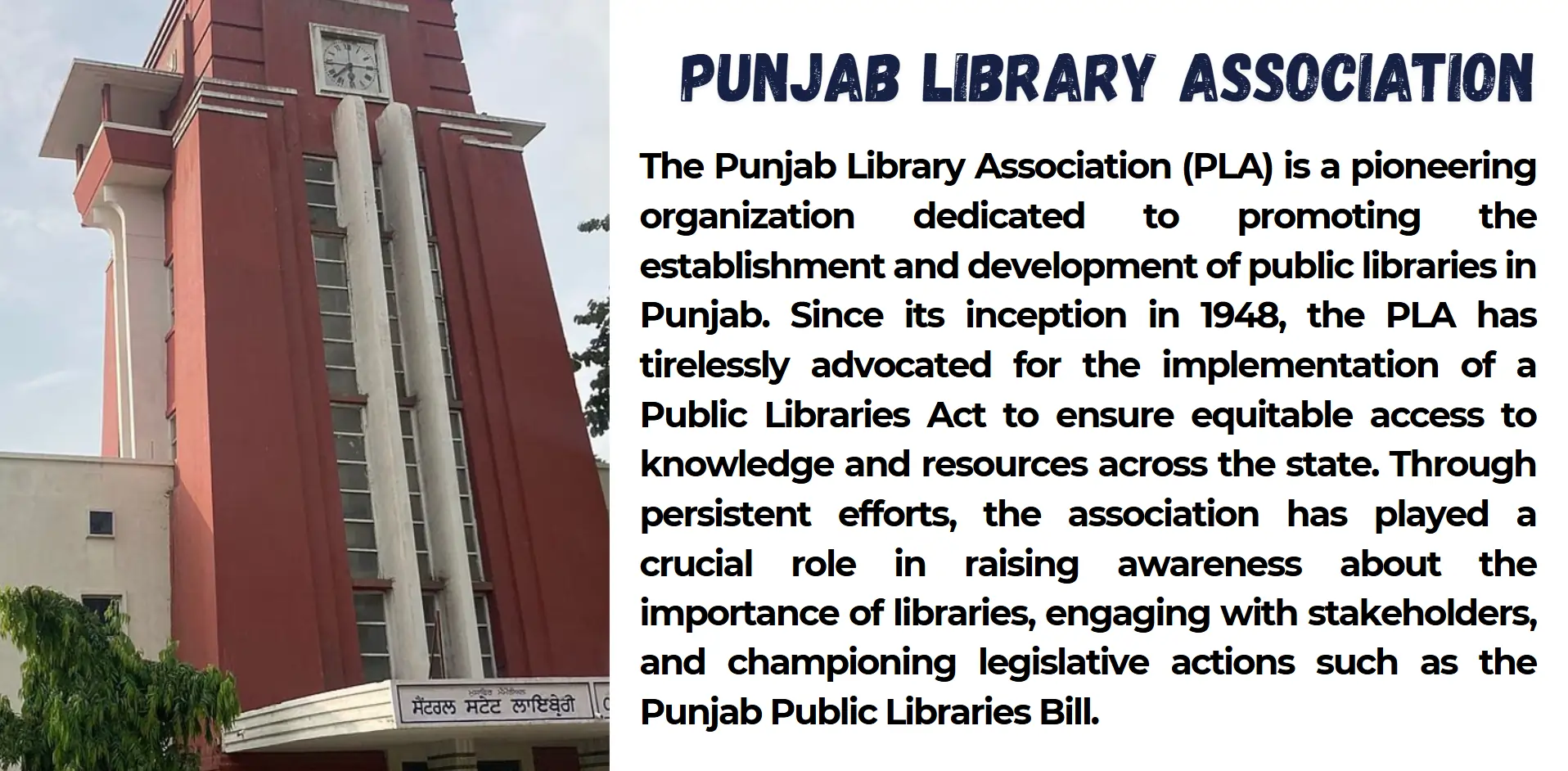The bill would make it possible for every Punjabi village with a library to have a computer with internet access, encouraging people to read more. But it's been in uncertainty for a while.

The community facilities symbolized by public libraries have been recognized for centuries as knowledge centres along with cultural preservation and neighbourhood outreach. Following the Punjab Public Libraries Bill's consideration, efforts to establish a comprehensive public library system in Punjab started to gain momentum. The bill presented this visionary approach in the mid-20th century before becoming an official state draft in 2011 to develop a library system connecting both city and rural communities. Numerous approvals did not lead to the execution of the bill because it encountered implementation obstacles. Several attempts to rebalance the failed bill emerged in recent times since officials started observing declining reading rates and increasing youth drug abuse problems. The revival movement of the Punjab Public Libraries Bill is gaining momentum with stakeholders because such a bill has the potential to entirely transform the cultural and intellectual aspects of the state. This article evaluates the theoretical aspects of the bill and studies active movements to re-establish it while analyzing its projection for the development of Punjab.
Historical Background
Public libraries exist as foundational educational institutions that serve multiple societies worldwide. The Punjab Public Libraries Bill was developed based on the progressive development needs of Punjab.
The Early Vision
In 1948 the Punjab Library Association (PLA) initiated support for creating a public library law that would establish a state-wide network throughout Punjab. The advocacy campaign worked to create an organized system of public libraries throughout Punjab because none currently existed.
Advocacy by the Punjab Library Association
For multiple years the PLA worked to create legal public library infrastructure that would give both city and rural areas equal library resource access. Political obstacles together with administrative challenges hindered the advancement of progress toward their goals.

Drafting of the Bill in 2011
The draft Punjab Public Libraries Bill emerged during 2011 after Sewa Singh Sekhwan introduced it as the Education Minister. The proposed bill established library services which would spread through districts to blocks and towns and extend to villages throughout the state.
Approval by the State Government
At that time the draft earned approval under then Chief Minister Parkash Singh Badal thereby opening the path for bill development. Educational and cultural infrastructure of the state underwent a transformative shift with this development.
Political Transitions and Challenges
The legislative elections of 2012 turned the national attention elsewhere so the bill remained inactive. Following the initial support the project received there was no government effort to prioritize it which prolonged the delay for its execution.
Missed Opportunities for Grants
Punjab failed to acquire necessary funding from both the central government and financial institutions such as the Raja Rammohun Roy Library Foundation despite having available opportunities.
Through the Punjab Public Libraries Bill the state expresses its commitment to construct a well-developed public library network. The history behind this facility shows how officials developed public libraries as well as the obstacles they confronted while creating universal library access programs.
What was in the Bill?
Under the Punjab Public Libraries Bill the state forms a large library network which provides knowledge access to every segment of Punjab society.
- State-wide Library Network: The bill establishes an organized system of libraries that will serve the wide range of people across Punjab. The library network begins with the Central Library at the state level followed by District Libraries then Block Libraries and Town Libraries and ends with Village Libraries. The framework ensures that reading materials and resources become available even to population centres that lie far from main locations.
- Governing Bodies: The proposed bill recommends the formation of particular governing bodies to maintain the functioning operations of all libraries. The Punjab Public Library Governing Board together with the State Public Library Directorate will make policies and coordinate activities and monitor operational effectiveness of the library system. These governing bodies function as essential entities that will handle the establishment of standards while confronting library obstacles.
- State Public Library Fund: The bill establishes the State Public Library Fund as its main provision to provide continuous financial backing for library operations along with development activities. The fund supports upgrades of building infrastructure and enables book purchases and digital resource acquisitions as well as training programs and fundamental operational needs.
- Integration of Existing Libraries: The proposed bill emphasizes the process to merge all existing libraries managed by municipal entities as well as NGOs and cooperative organizations with the state-wide library network. Through this integrated approach functions will be simplified and resource use will be maximized throughout the entire state.
- Modernization and Accessibility: The proposed legislation recognizes modernization through its commitment to digitization and new technology adoption. Both digital books and online journals and library materials will be available through the modern library system. The system will prioritize accessibility improvements which will enable differently-abled people to use the accessibility facilities across the state.
Through the Punjab Public Libraries Bill the state promotes knowledge equality while enabling life-long educational development throughout the entire province. The law shows strong dedication to develop both intellectual and cultural elements in Punjab.
Challenges and Delays
The visionary Punjab Public Libraries Bill has encountered multiple obstacles throughout its entire existence after its initial introduction. Implementation delays are owed to multiple challenges that have prevented the establishment of an extensive library network.
Impact of Political Transition
The 2012 legislative election stood as the main reason the bill experienced setbacks. The new government administration lost focus on the bill after taking control during the legislative election of 2012. The leadership transition caused organizations to shift their attention to urgent matters which abandoned the pending bill.
Lack of Consistent Political Will
The bill experienced different levels of revival interest from successive governments. There remains a substantial barrier to the bill's progress because supporters have shown no dedicated action toward its advancement. Political support for long-term obligations shows inconsistent patterns which prove the difficulties of maintaining sustained political agreement.
Funding Shortages
The library system funding depended largely on government support where central government responsibilities matched state government responsibilities at 60:40 ratios. The situation became complicated for the state when it had difficulty distributing its allocated funds. Bills faced impediments from financial difficulties which prevented organizations from obtaining adequate funding needed to carry out the implementation.
Missed Grant Opportunities
Punjab lost valuable financial opportunities through failing to use grants offered by Raja Rammohun Roy Library Foundation despite their potential to provide essential funding. The failure to seize available funding opportunities made funding problems worse thus delaying the creation of the planned library network.
Administrative Hurdles
The implementation delays of the bill exist mostly due to political hurdles alongside insufficient financial support and also stem from inefficient administrative processes. The slow-down in progress stems from inadequate procedures to unite current libraries with governing organizations. Various coordination faults in this process have led to substantial delays for the bill to move forward.
The implementation of the Punjab Public Libraries Bill faces numerous obstacles along with profound operational delays in its development as a large-scale project. The state requires an urgent revival of this bill to develop education alongside culture and community development in Punjab. Every stakeholder needs to act jointly because the situation requires urgent action.
Recent Efforts for Revival
Since its long-time dormancy the Punjab Public Libraries Bill receives renewed support to revive its original provisions that will develop an inclusive public library system across Punjab.
The PLA recent efforts
The Punjab Library Association functions as a primary entity working to revive attention for this bill. The association made persistent efforts in public advocacy so that public libraries gained proper visibility for the importance they provide to the community. The organization seeks to establish public knowledge about bill advantages before pushing the government to fulfil its commitments.
Engagement with Government Officials
Around the same time numerous representatives from the association began carrying out direct talks with state government ministers. Multiple sessions between the Education Minister and the Minister for Governance Reforms have emphasized the essential need to enact the proposed legislation. These interactions between members seek to obtain official support that will make the bill into a main priority for the state government.
Promotion of Libraries as Social Hubs
The proponents of the bill believe public libraries hold strong abilities to address various societal problems. The public library serves as a tool that builds productive youth relationships while fighting drug abuse which presents serious challenges in Punjab. The story has played an essential role in gathering backing to reinvigorate the bill.
Community Outreach and Public Support
The drive to bring the bill back into action goes past official government halls. Advocacy groups plan public gatherings and instructive workshops as well as publicity campaigns in support of the initiative. The activities show widespread community interest in accessing public libraries because they offer essential roles in developing communities.
Leveraging Digital Transformation
The public library system requires modernization through the integration of digital resources and technological advancements according to its recent supporters. The establishment of mixed physical and digital library networks supports the state's digital transformation agenda and therefore contributes modern elements to revival efforts.
Multiple coordinated strides show a united commitment to restore the Punjab Public Libraries Bill because they seek to promote knowledge, education and cultural development for Punjab residents.
Significance of Revival
The revival of the Punjab Public Libraries Bill will produce substantial effects on social development and educational progression as well as heritage preservation.
Enhanced Access to Knowledge
The bill revival initiative will allow every community in Punjab to receive valuable knowledge resources particularly targeting rural and underdeveloped areas. When libraries establish themselves through an organized network every member of society would obtain learning opportunities that build an on-going tradition of education.
Promoting Education and Literacy
Libraries significantly boost literacy levels through their ordinance that allows people to access educational content and reading materials without any costs. The implementation of this bill seeks to overcome educational resource shortages which affect mostly populations with limited economic opportunities. Such efforts will eventually help minimize educational social stratification in the state.
Support for Youth Development
The youth of Punjab encounter critical difficulties which combine substance abuse problems with inadequate available avenues to develop constructively. The proposed bill establishes public libraries as secure areas where young people can use their energy toward education and skill acquisition. The libraries' educational content and program offerings will show young people productive paths toward enhancing social welfare.
Cultural and Heritage Preservation
Through the revival of this bill Punjab will have the chance to safeguard its traditional, cultural and literary values. Libraries should build collections that unite Punjab's historical manuscripts with local literature and fundamental documents enabling both domestic preservation and outside resource access for future generations.
Modernization and Digital Empowerment
Digital incorporation into the proposed library scheme matches contemporary technology standards of learning. The reform of the bill enables libraries to provide digital access to electronic books and academic resources which preserves their position as leaders in the digital landscape.
Conclusion
The Piedmont Public Libraries Bill revival provides an essential step to build bridges between educational points while protecting culture and establishing learning and community access spaces. Through library development solutions and digital implementation combined with persistent challenge remedy efforts this plan will change the intellectual and social makeup of Punjab. The bill’s implementation will serves as a transformative process to bestow knowledge and resources which both empower the youth and aid the development of society. All stakeholders must make library advancement their top priority to establish these facilities as key agents of advancement that will benefit generations to come in Punjab.